What Does the Internet Know About Breaking into UX Research?

Jennifer Hillhouse
UX Researcher
6 min
That first peek of UX above the fold
I first heard of UX research during the second year of my marketing career. A colleague mentioned in passing about effective button placement on a website. Above the fold or above the ads, they said. I remember thinking, “Someone can measure that?”
In the end, we went with whatever placement would be most profitable; the UX of it all backsliding on our priority list. But it got the industry pinging on my radar.
Fast forward a couple of years and I’ve earned a master’s degree in User Experience Design and am working as a Junior UX Researcher for a sports betting company. I’m glad to say that I have found my niche in UXR.
These days, I often look in my rearview mirror and wonder how different my journey was from others who’ve made their way into UX research. Did they also stumble across the field by way of another industry? Or did they complete a UX bootcamp or certification program?
More importantly, what does the internet know about breaking into UX Research?

From Google Trends: Interest over time for Googling “UX Researcher” in the United States. A value of 100 is peak popularity, 50 is half, 0 is not enough data.
Social listening tools and keyword analysis tools have perhaps a more common use case in marketing research and SEO. But for wanting a topographical view of what the general population wants to know about a topic, or what knowledge gaps exist for that topic, they’re a great tool to add to a researcher’s toolkit.
“SEO data provides information about the keywords and phrases users search for on a website. By analyzing these keywords, UX researchers can gain insights into user intent and the language users use to describe their needs and interests. Similarly, SEO data reveals users’ language when expressing their needs and wants.” Esmee Lewis, Make it Clear
As I’m still a couple of years into my UXR transition from my marketing past, past, I still occasionally reference these tools for a quick pulse of social traction on whatever I’m researching. Though lacking in a qualitative or quantitative context other research methods and tools can provide, keyword analytics and social listening methods are a good gut check if you’re concerned about launching something with questionable demand.
So why not start here to understand what the internet thinks about breaking into UXR?
UX Research is still a mystery to the internet at large
“77% of people use Google several times per day, with an average of 3-4 searches per person.” From MOZ: We Surveyed 1,400 Searchers About Google — Here’s What We Learned by Lily Ray.
Knowing that, I think it’s reasonable to say if you don’t know something heading to Google is the first step.
This makes understanding if the internet at large knows what UX Research is fairly simple. All we have to see are the types of related questions to a keyword like “UX Research.”
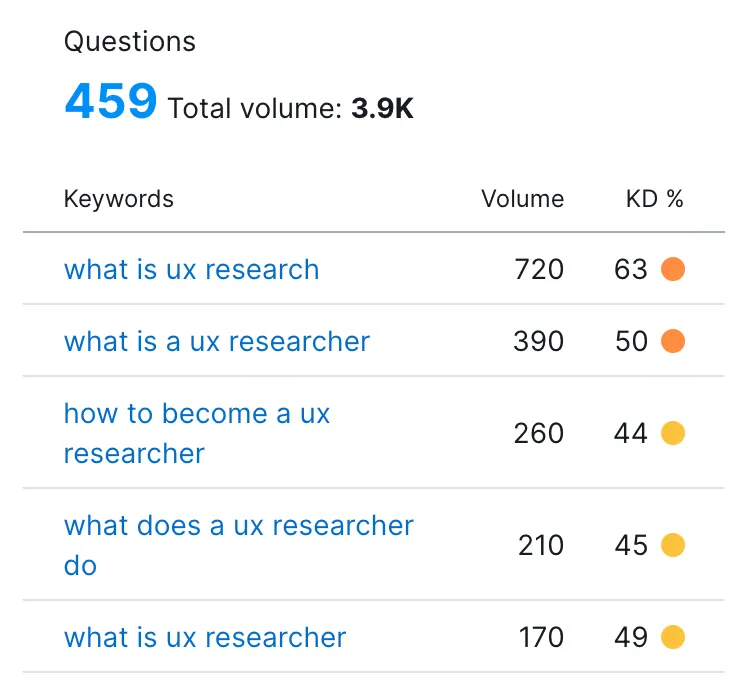
From SEMRUSH: Today’s (June 19th, 2024) top questions surrounding the keyword “UX Research”
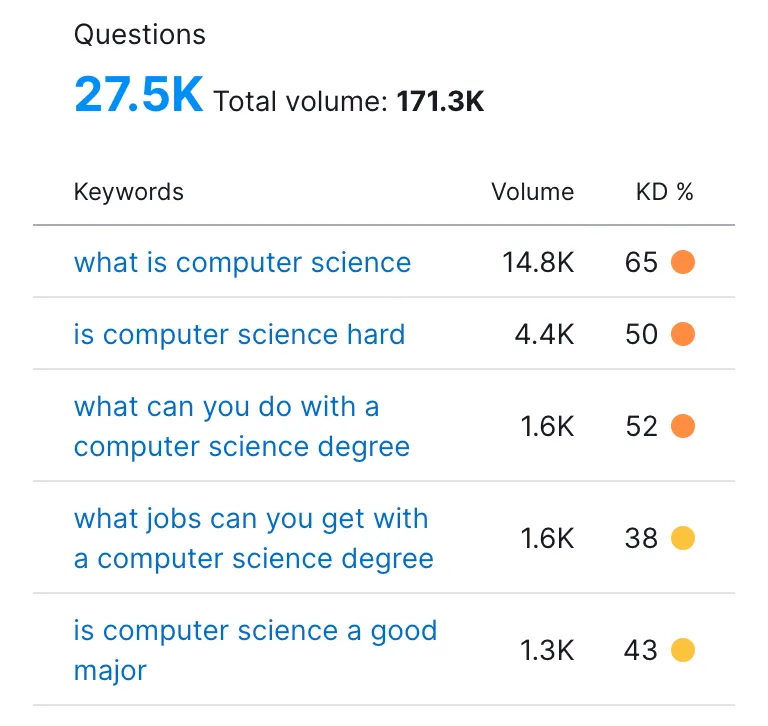
From SEMRUSH: Today’s (June 19, 2024) top questions surrounding the keyword “Computer Science”
When we compare the questions people have for the keyword “UX Research” to another slightly older more and established discipline in the tech industry, “Computer Science”, we can find that there’s a long list of questions beginning with “What is” and “What does” on the UX Research side of things.
People searching for “UX Research” generally seem to be seeking to understand what UX Research is and what UX Researchers do. In contrast, people searching the keywords “Computer Science” seem to understand the field and want to know pay scales, necessary degrees, and current market opportunities.
From the foundational questions being asked, we can pretty confidently say that the internet wants to know what UX Research is all about. But where are they going to learn?
Pithy ads are mostly what the top articles on search engines can provide for learning about UXR
When we investigate where people learn about UXR we begin to encroach on the territory of how SEO marketing practices have ruined our ability to find information we need on the internet.
For the complete beginner wanting to know the TL;DR basics of the discipline, an easy to digest foundational text that describes best practices, working models, and uses would be great to find when you Google “UX Research.” Which we know, the people who are Googling “UX Research,” are here seeking foundational knowledge.
Instead, the top websites featured on the search engine results page (SERP) are blogs from either tooling providers or websites offering courses.
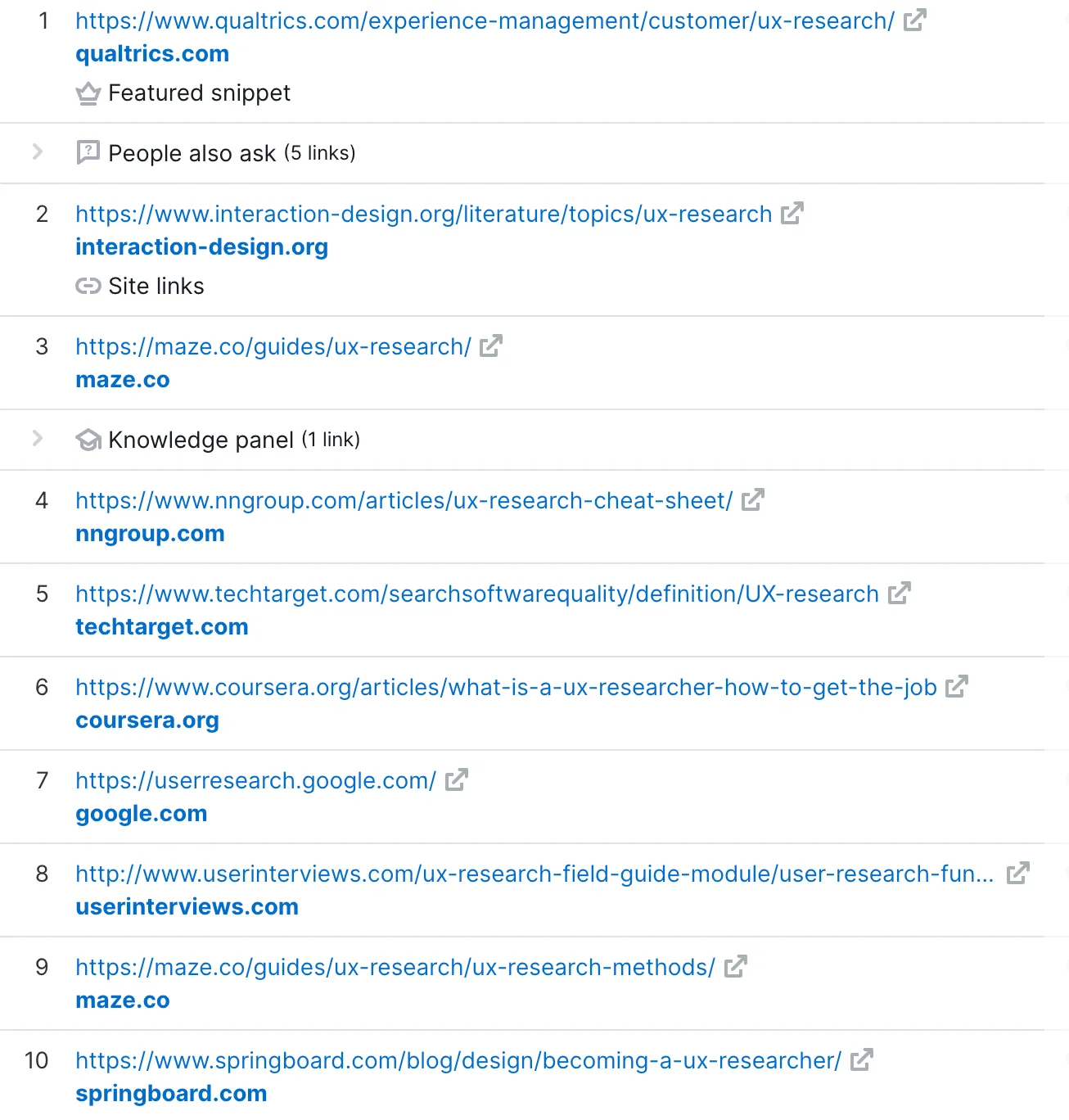
From SEMRUSH: Top SERP results for “UX Research.”
While these tools and courses these websites are trying to sell us are no doubt useful, are the scrappy 5-minute blog optimized for SEO to get site traffic and not teaching the best place to learn about an entire field?
Neilsen Norman, I swear I’m not talking about you.
“Google had started with a noble cause: trying to make the internet easier to navigate at scale. The company did accomplish that goal, but in doing so, it inadvertently and profoundly changed how the internet looked. The problem lay in Google trying to be an objective and neutral arbiter of an information landscape that was meant to pretend it did not exist. You cannot design a free, automated system to help people find information without some people trying to game that system.” Amanda Chicago Lewis, The Verge
If we switch from keyword analytics tools to Reddit to understand where people are going to learn about UXR, it feels a bit like stepping out from Times Square covered in billboards flashing BUY BUY BUY to a cozy little curated bookstore laden with quietly conversational fellow topic-searchers with varying degrees of subject matter knowledge.
Okay, obviously not all of Reddit is quite this peaceful, but r/UXResearch seems to be.
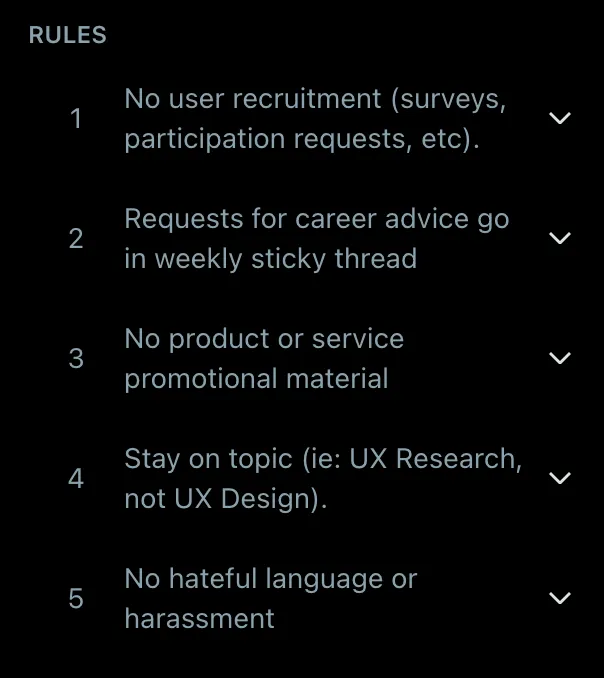
r/UXResearch Rules help keep things civil.
#3 seems to turn a wary eye towards SEO blogs.
Ask r/UXReseach for “ux research foundational texts articles,” and we can see measured and thoughtful discussion from (supposedly?) people who have (supposedly?) read the texts they’re recommending. It feels like a colleague giving you a new read.
Some crowd favourites (comment yours!):
As a starting point for foundational knowledge, reading these books will likely take a whole lot longer than a quick SEO blog, but the depth of knowledge is no doubt superior.
So, we can assume most people’s first brush with learning about UX Research involves reading these blogs, but what are people actually doing to break into UXR?
Where do UX Researchers even come from?
Compared to other tech roles, we can see that researchers come to be largely through higher education.
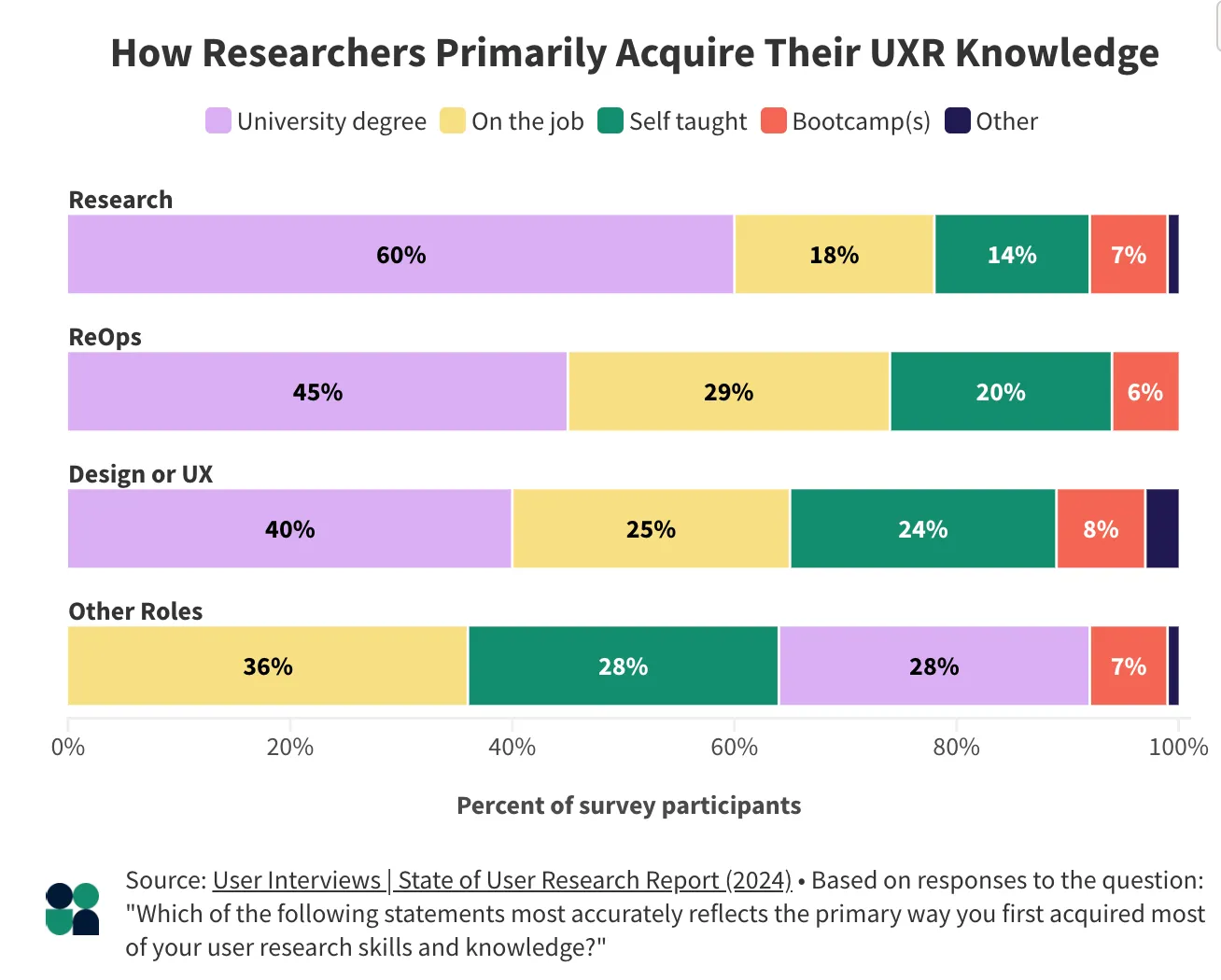
From User Interviews “The State of User Research Report (2024)”
Not surprising since universities do a lot of research so there would be a natural place for those seeking to learn research rigour and standards. But what’s not featured in the report is the backgrounds of these researchers. If they’re going to university to learn, what degrees are they getting?
Back to r/UXResearch, where UX Researchers seem to live, the most frequently mentioned degrees of varying level that commenters purported to help them break into UXR are:
Psychology.
Human Computer Interaction.
UI/UX Development.
Yet, a university degree doesn’t describe the background of all researchers. There’s still a good 40% of researchers who learn on the job, are self-taught, learn from bootcamps, or other sources.
We can wonder what learning tools and methods this 40% has used; are these researchers learning through certificate programs, self-reading, mentorships, internships, or some other method?
Whatever the case, it’s clear the internet agrees that there is no one “right path” to UX Research.
The path often twists and turns
Just like how researchers come from no one single source, the tools we use to seek information can also take us down different paths to reach our destination.
For those who begin by Googling, you may have found yourself considering buying a virtual UXR course as a first career step from the publisher of a blog you thought was informative. For those who began by crowdsourcing on Reddit, maybe you found yourself reading a book or two that was recommended by others who seem to be in the industry. And for those who started in a classroom, maybe you started with squinting to decipher a professor’s handwriting.
For myself, I learned the rigour, connectivity, and creativity asked of UX Research on the job through my experience as a co-op student as part of my Master’s program.
While my degree was in UXD and didn’t have a focus on research, it opened the door for me to explore UXR on my own through co-op experiential learning. During my co-op experience, I learned so much from my mentors and from collaborating with participants, stakeholders, and cross-functional teams. With every project touchpoint, I feel myself making small adjustments that are gradually shaping me to evolve into an industry professional with dedicated knowledge and expertise.
So next time you Google to learn the responsibilities of _____ in our industry, I encourage you to find the offshoots of the path you're traveling.
